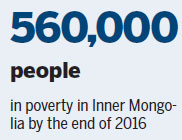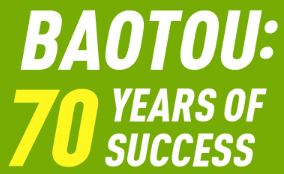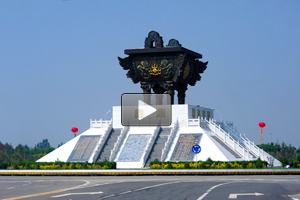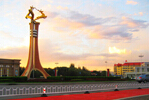New MRI equipment ferries hope to remote regions
A new vehicle that can transport magnetic resonance imaging, or MRI equipment, and other key medical devices has been introduced to the Inner Mongolia autonomous region, in an important initiative that will provide treatment in remote areas from otherwise relatively immovable heavyweight medical machines.
The vehicle, the Chiying A30, was made by Baotou-based medical and hospital equipment manufacturer XBO Medical Systems Co Ltd.
General Manager Wang Yongzhong said the vehicle is China's first mobile transporter for MRI equipment, which is widely used in hospitals to get internal pictures and scan the anatomy and organs of patients.
"Usually, a MRI machine is too large and heavy to move around and patients can only get their bodies' images in a hospital," Wang said.
But poor people in rural areas usually can't easily get access to advanced hospitals.
Inner Mongolia had an estimated 560,000 poverty-stricken people by the end of 2016, most of whom live in distant rural areas, according to the regional government.
The autonomous region is pushing to improve medical services for poor and remote areas, to equip them with permanent as well as mobile medical equipment.
The target is that by 2020, some 90 percent of people in the autonomous region will be able to receive such medical treatment.
"Mobile medical devices will be able to help us reach the goal," Wang said.

The new vehicle is not only an ambulance that can only ferry sick or injured people to hospital and provide simple medical services.
Wang said it would also have a variety of ancillary applications in different fields, operating in remote and poverty-stricken areas that lack hospitals and sophisticated medical devices.
He added the MRI machine inside the vehicle was a smaller and portable version of the standard hospital-bound model and was equipped with remote monitoring function. Even if there were no doctors in the vehicle, treatment schedules can be provided via the remote monitoring device.
In addition, the portable service is linked to cloud computing and test results can be transmitted to computers in hospitals, ensuring an optimal diagnosis by doctors.
Aside from the MRI and remote monitoring devices, other medical key equipment for the examination and treatment of patients is also available in the vehicle.
XBO was founded in 2010, with registered capital of 500 million yuan ($74 million). Its main shareholder, with a 40 percent stake, is China Northern Rare Earth (Group) High-Tech Co Ltd, one of the country's leading rare earth companies.
Its main products are magnetic resonance imaging machines which use rare earth-powered magnets.
According to the local government, the Baotou region holds an estimated 43.5 million metric tons of rare earth, accounting for more than 80 percent of China's total reserves and 30 percent of the world's reserves.
Contact the writers at zhangyu1@chinadaily.com.cn
(China Daily 08/02/2017 page16)





 Baotou, China
Baotou, China